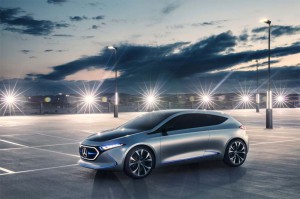Daimler will invest 500 million euros, or $588 million, to tool up a plant in France that will produce an all-electric vehicle targeting the Tesla Model 3.
The German automaker has announced major plans for entering the battery-electric vehicle, or BEV, market. That includes products like the compact concept vehicle Mercedes-Benz revealed at the Frankfurt Motor Show last September.
The French battery-car will be based on that EQA prototype. By 2022, the new Mercedes-EQ sub-brand will be selling 10 BEVs. That’s on top of the electrified models to be offered by Daimler’s Smart brand.
The Friday announcement means that the plant in Hambach, France, will produce Mercedes-badged models for the first time. It was originally set up to handle products for Daimler’s Smart brand.
(Daimler profits drop double digits despite strong car sales. Click Here for the story.)
“The Smart plant in Hambach will become a part of our global compact car production network with the lead plant in Rastatt, Germany,” Mercedes-Benz production chief Markus Schaefer said Friday.

Daimler CEO Dieter Zetsche (l) meets with French Pres. Emmanuel Macron to discuss plans for the Hambach plant.
German automakers were slow to embrace electrification, initially focusing on conventional hybrids and plug-in hybrids. Mercedes currently offers 10 different PHEV models in various global markets. But it is getting ready for a push into full electrification.
That move has been driven by a variety of factors. For one thing, German carmakers, in general, are migrating away from the diesel-powered products that dominated their line-ups in the wake of the Volkswagen diesel emissions scandal.
Mercedes and rivals like Volkswagen AG and BMW also are responding to increasingly stringent emissions and fuel economy standards in key markets like Europe, China and the U.S. China, in particular, recently enacted strict rules maintaining sales targets for zero-emissions vehicles, such as the production version of the EQA.
Traditional automakers are also responding to the threat posed by Tesla. Though the California electric-vehicle company is facing some serious challenges, it has also shown itself a formidable competitor. Last year, Tesla sold 101,312 vehicles, almost all of those Model S sedans and Model X SUVs that compete with flagship luxury offerings such as the Mercedes S-Class.
(Click Here for more about the impact of AMG and Maybach on Mercedes sales.)
Tesla CEO Elon Musk has declared his goal of building 400,000 Model 3 sedans a year at the company’s Fremont, California factory. While that assembly plant has been facing serious production issues, the Model 3 would challenge such compact luxury segment stalwarts as the Mercedes C-Class and BMW 3-Series if it eventually hits Musk’s numbers.
Daimler recently launched a new version of the Smart Fortwo electric vehicle. Plans for the microcar brand call for phasing out all models using internal combustion engines. The U.S. market is already making that transition.
Those Smart electric models will continue to be built at the Hambach plant. The factory produced just 80,000 Smart cars last year. The new plans will see Hambach undergo a significant expansion, though Daimler has not revealed what the new capacity will be.
The French plant first went into operation 20 years ago, noted Daimler CEO Dieter Zetsche, on Friday. “Now we take the next step and for the first time in our more than 100-year old history we bring the production of Mercedes-Benz to France. With the compact EQ model from Hambach we continue our electric initiative.”
The new Mercedes-EQ sub-brand will debut in 2019 with the introduction of the EQC. To be assembled at the company’s plant in Bremen, Germany, it will be an all-electric SUV sharing its underpinnings with the current Mercedes-Benz GLC, the luxury brand’s best-selling utility vehicle.
(To check out the Mercedes-AMG GT 63 S Edition 1: A special version of a special car, Click Here.)
Eventually, Mercedes intends to offer a variety of conventional and alternative powertrain options for virtually all of its products, unlike Tesla which remains focused on battery-electric vehicles alone.


